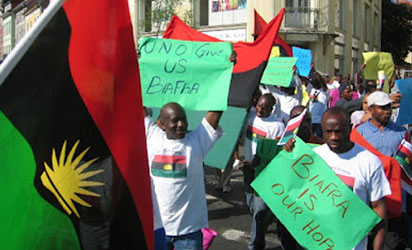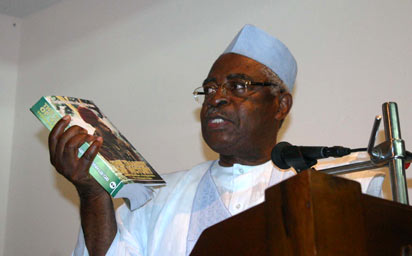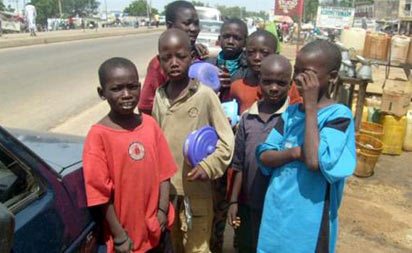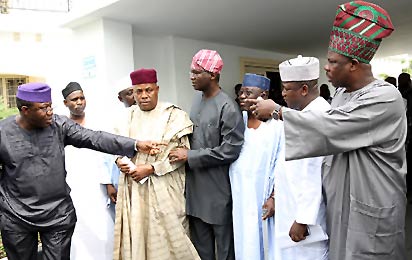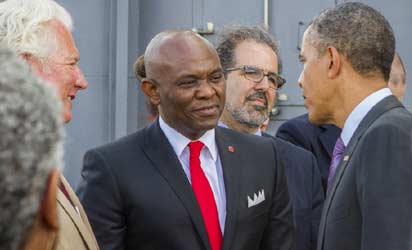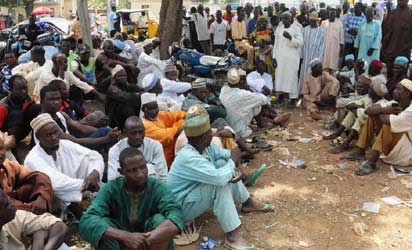WHEN the Nigerian Governors Forum, NGF, election politics was raging and some commentators said Their Excellencies were wasting time on an irrelevant issue that had no bearing on the average Nigerian, I laughed.
It reminded me of what Mohandas Gandhi said about religion and politics: “Those who say religion has nothing to do with politics don’t know what religion is”. They did not remember that a governor is first of all a politician, and a politician’s first reflex is to play the power game.
The NGF election of May 2013 was a dress rehearsal for the shape of things to come, especially in the Peoples Democratic Party, PDP. The PDP knew it was going to expose the treachery, disloyalty and rebellion of the governors bent on ensuring that President Goodluck Jonathan does not win his second term.
[caption id="attachment_412041" align="alignnone" width="412"]
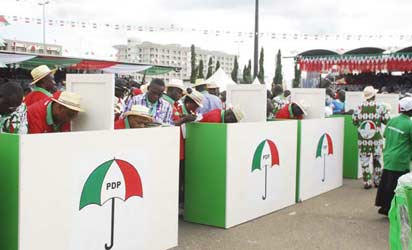 PDP Special National Convention: Delegates casting their votes at 2013 PDP Special National Convention . Photo by Gbemiga Olamikan.[/caption]
PDP Special National Convention: Delegates casting their votes at 2013 PDP Special National Convention . Photo by Gbemiga Olamikan.[/caption]The Governor of Rivers State, Chibuike Amaechi, was advised to forgo that election and avoid being used by Northern governors to divide the solidarity of the South-South. He refused to listen. Egged on by the opposition All Progressives Congress, APC, governors, the rebellious Northern governors as well as their vocal supporters in the media and open forums, Amaechi plunged into the contest.
The recently concluded national convention of the PDP ended with the rebellious Northern governors – Rabiu Kwankwaso of Kano, Magatakarda Wamakko of Sokoto, Aliyu Babangida of Niger, Sule Lamido of Jigawa, Murtala Nyako of Adamawa, Amaechi of Rivers and Abdulfatah Ahmed of Kwara (who was then dancing on the sidelines) – pulling out to form what they termed “new” PDP.
A familiar newcomer, former Vice President, Alhaji Atiku Abubakar and his handy political peripherals were there.Within the space of one week, we saw the registration of Peoples Democratic Movement, PDM, as a political party, the announcement of the intention of the rebellious Northern governors to register a new party to be called Voice of the People, VOP and the “secession” to form the “new” PDP.
They do not quite seem to have made up their minds exactly what to do, except that they are all united in their determination to pull the rug from under the feet of the President come 2015. The central question trailing this development is what effect this will have on the ruling party.
The question is best answered by looking at every mid-term to a presidential election year since the return of democracy in 1999. In 2001/2002, there was turmoil in PDP because Atiku’s PDM faction wanted former President Olusegun Obasanjo to “do a Nelson Mandela” and hand over to Atiku after only one term in 2003.
They failed because Obasanjo not only ran for second term but also forced Atiku to run with him as Vice President.In the 2005/2006 midterm toward the 2007 presidential election, another series of crises erupted in the party.
The first was over the determination of Obasanjo’s camp to de-register those big stakeholders in the party opposed to his third term ambition as members of PDP. That was how Atiku and many others were pushed out. This eventually resulted in Atiku becoming the presidential candidate of the opposition Action Congress, AC, for the 2007 election.
The second was the attempt by Obasanjo to use the then ongoing constitution amendment to give himself a third term. Atiku vehemently opposed this bid, along with majority of Nigerians. A crisis-riddled PDP was very instrumental to the abortion of its leader’s unholy ambition.Come the year 2010, the nation was in a heated transition from one president to the other when President Umaru Yar’Adua passed away.
Some Northern leaders did not want then Vice President Goodluck Jonathan to succeed Yar’Adua because they said it was the turn of the North to rule for eight years after Obasanjo’s eight. Later, they grudgingly caved in to pressure, only on the condition that he would not seek an election of his own.
Therefore, the PDP crisis in 2010/2011 was basically a section of the Northern leadership versus President Jonathan. Jonathan successfully defeated the regional gang-up against him, and some say the Boko Haram terrorism is a fulfillment of their threat to make Nigeria ungovernable.Against this background, I tend to see this PDP crisis as a teacup storm.
The party is used to them. The party always comes out of these storms intact and strong enough to win the next election. The PDP is a veteran of many civil wars. These wars will never end because they are normal jostling and positioning to hijack the party and use it to win. As it happens, the incumbent President, being the leader of the Party and the man who holds the proverbial knife and yam, he is always best placed to hijack the party for his own political ends.
Much is being made over the “splitting” of the PDP after the convention. It pays to ruminate more on the possible long term survival of the “split”. Ordinarily, the pullout of seven out of 23 governors of the Party to form a “new” PDP is considerably earth-shaking.
In 2010 when the Adamu Ciroma-led Northern Political Leaders Forum, NPLF, queued behind Atiku to drag the PDP presidential ticket with President Jonathan, the governors had kept their distances, obviously because they were looking for second term tickets. Now that all of them are on their ways out, they can afford to join the effort against the President.
The question is: Who will step down for whom? Lamido, Atiku, Kwankwaso and Aliyu are all known to have presidential ambition. Lamido, an ardent Obasanjo supporter, is several times on record pouring vitriol on Atiku as a political leader.
Kwankwaso is also an Obasanjo lackey. Would they agree to step down for Atiku when the time comes? Will they go with Atiku to PDM? It does not seem likely. Some of them may reconcile with Jonathan any time, especially when Obasanjo gives the President one hundred per cent support. Nigeria politicians are not known to voluntarily jump down from the gravy train.
